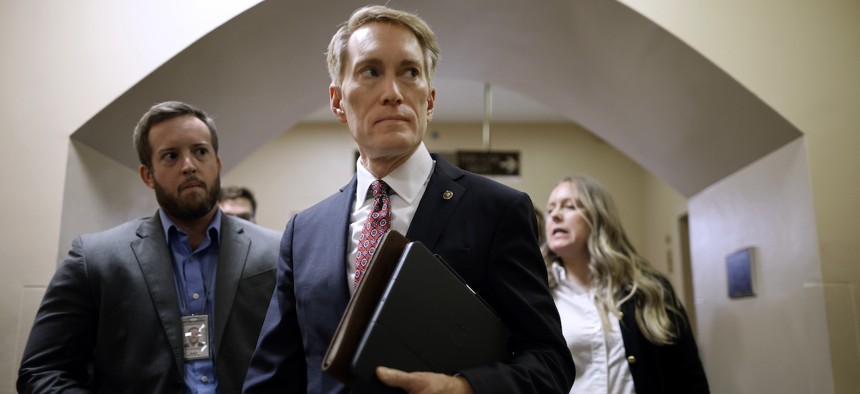
Sen. James Lankford, R-Oklahoma., arrives at the U.S. Capitol ahead of votes on Feb. 7, 2024. Lankford is the lead Republican negotiator of the bipartisan immigration and border security legislation that was introduced on Sunday and immediately shot down by members of his own party. Chip Somodevilla/Getty Images
Senate rejects border-related federal hiring surge after Republicans turn on deal
The $118 billion personnel, border security, immigration reform and foreign aid measure collapsed just days after it came together.
The Senate on Wednesday voted down a bipartisan proposal that included billions of dollars in new spending to hire more than 7,000 federal immigration and border personnel, dealing a major blow to President Biden’s efforts to ramp up resources for agencies that have for years complained they are stretched thin.
The measure failed a procedural vote 49-50 after months of negotiations to pair tighter border security with an aid package for foreign allies. The $118 billion bill included more than $18 billion for DHS, $900 million for Justice and close to another $1 billion for border and immigration related issues at other agencies.
The legislation would have supported more than 4,300 asylum officers at U.S. Citizenship and Immigration Services, 1,500 new Customs and Border Protection personnel—including both Border Patrol agents and customs officers—1,200 Immigration and Customs Enforcement employees, 100 immigration judges and support staff and additional USCIS staff.
Sens. James Lankford, R-Okla., Krysten Sinema, I-Ariz., and Chris Murphy, D-Conn., who negotiated the deal and fought unsuccessfully to win support from at least 60 senators, included in the measure several provisions to aid in the hiring of those employees. USCIS and ICE would have received direct hire authority—allowing the agencies to bypass normal restrictions that slow down federal onboarding—for five years. CBP would for three years have received a waiver from conducting polygraph tests for any applicant who received one in the previous 10 years for any other law enforcement agency.
The USCIS hiring would have amounted to a complete makeover of the agency. Its entire Asylum Division had 760 asylum officers on staff as of September, with 300 additional authorized positions vacant. Lawmakers proposed significant assistance to the agency for its efforts to quintuple that workforce, including by boosting base pay for General Schedule positions by 15%.
As part of the policy changes that required lengthy negotiations and slowed down the supplemental funding package since President Biden first requested it in October, asylum officers would have been tasked with quickly processing a far greater share of asylum claims and appeals. ICE agents would have been tasked with removing more migrants and doing so more quickly. The $7.6 billion the agency would have received would have nearly matched its entire budget for fiscal 2023.
Biden this week implored lawmakers to rally behind the bill, calling it tough and fair, and saying it delivered on the exact requests made by front-line employees and congressional Republicans. He said the measure would “get the resources to the border to get the job done” and “finally provide the funding that I have repeatedly, repeatedly requested, most recently in October, to actually secure the border.” In addition to the immigration reform and hiring provisions, Biden touted the parts of the bill that would have provided $60 billion for aid in Ukraine, $14 billion for aid in Israel, $9 billion for humanitarian assistance and $4.8 billion for allies in the Indo-Pacific.
Immediately after the vote failed, the Senate moved to begin debate on an alternate measure that stripped out all the Homeland Security Department hiring and immigration reforms and included only the $95 billion in aid. That vote was still ongoing as of publication as Senate leadership were determining their path forward.
Ahead of Wednesday’s vote, at least some federal employee groups threw their support behind the border measure. The National Border Patrol Council, which endorsed President Trump in 2020 and has frequently criticized Biden’s approach at the border, endorsed the bill, saying it would empower their members with new authority they have not previously enjoyed. The National Treasury Employees Union sent a letter to members of the Senate on Wednesday urging them to support the bill, saying the CBP funding and hiring provisions would enable the agency to “increase illicit fentanyl seizures and save lives.”
Under the bill, migrants entering the country would have either been detained or faced government monitoring while they await the outcome of their hastened asylum screening. Border Patrol would have been required to immediately turn away any migrant who enters the country if the seven-day average of daily encounters reached 5,000, though CBP officers could have continued to process 1,400 arrivals per day at ports of entry. Any migrant who was detained two or more times after crossing illegally during a border “shutdown” period would have faced a one-year ban on entry into the United States, adding consequences not seen when the Title 42 policy was in effect.
Migrant encounters have in recent months jumped to unprecedented levels. In December, encounters at the southwest border reached 10,000 per day and eclipsed 300,000 for the month for the first time ever. The backlog at immigration courts has topped 3 million cases and USCIS’s asylum backlog is nearing 1 million, both also all-time records. The funding stream for USCIS would offer newfound stability for the often cash-strapped, and largely fee-funded, agency.
The bill sank in large part due to pressure placed on Republican senators by House leadership and former President Trump, who has made the issue a key pillar of his campaign. House Speaker Mike Johnson, R-La., and his leadership team said the bill was “dead on arrival” if it made its way to the lower chamber. In the end, only four Republican senators voted to move forward with the legislation and even Senate Minority Leader Mitch McConnell, R-Ky., who endorsed the bill on Monday, voted against it.







